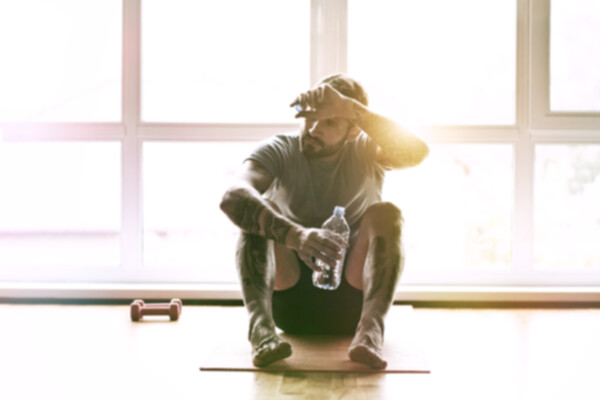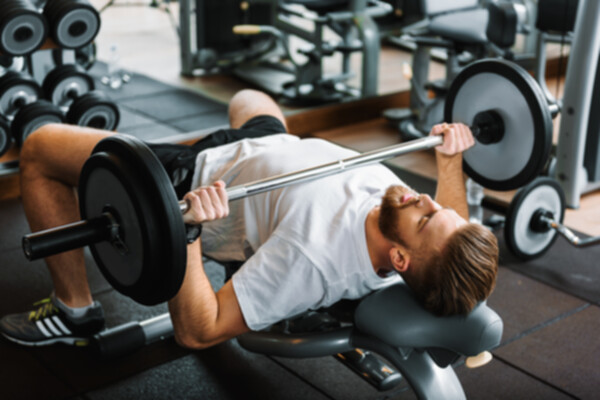What is it and what are the signs that identify vigorexia? When does excessive concern about the body become a psychological disorder? Find out how to identify it.

The vigorexia, also known as muscle dysmorphia, is a psychological disorder in which people develop an obsession or great concern with their body image. In this case, vigorexia, which is usually worked on with other disorders that generate an unhealthy relationship with food, occurs in a higher percentage in men, unlike others such as anorexia or bulimia.
This disorder has emerged with greater force, in recent years, due to the influence and culture around the idea of the perfect body. With the whole real food and fit lifestyle movement, it has also been influenced, since many people can take these learnings or ways of life to the extreme, thus losing their basis.
This sports addiction It is also associated with an obsession with body image. These are two phenomena that have emerged in recent times due to the influence and culture around the idea of the perfect body.
What is vigorexia? Definition
The vigorexia also called bigorexia (from the English ‘big’ meaning large) or muscle dysmorphia, is defined in the Diagnostic and Statistical Manual (DSM-5) as a body dysmorphic disorder in which an alteration occurs in how we perceive our body, in this case, underestimating it. We think that we are not fit or strong enough, and therefore, we generate certain types of actions that are harmful to us.
A vigoréxico or vigoréxica He tends to become obsessed with the idea that his body needs more, the way it is currently is not enough, he actively seeks to change this by increasing muscle mass. This obsessive thinking ends up influencing her behavior, causing her to adopt unhealthy attitudes toward diet and exercise.
Symptoms of vigorexia
When a person suffers from vigorexia He becomes obsessed with the appearance of his body, influencing him to engage in behaviors to increase muscle, whether healthy or not. This psychological disorder is characterized by the following.
- Excess exercise: The vigorousexicos They usually spend many hours of their day doing exercises to increase their muscle mass. In fact, one of the signs and symptoms or examples of muscle dysmorphia are those people who never skip their gym routine as well as dedicate almost all of their free time to exercising. In the case of skipping it, they usually feel very aversive emotions, even anxiety.
- Restrictive diets: The excessive worry around the perfect body ends up leading people with vigorexia to follow diets, which seek high protein consumption and very low fat consumption.
- Distorted body perception: A vigoréxico or vigoréxica He usually hates his body, since he perceives constant deficiencies due to the obsession with being a muscular woman or man.
- Use of steroids or other substances: The vigorousexicos They may choose to use steroids in order to achieve their body idealization.
- Depression and thoughts of suicide: This Psychological trastorn It can end up triggering constant frustration, anxiety and stress, trying to reach an idealized and perfect body, which is why, in some cases, these types of thoughts can lead to suicidal ideas.
- Anxiety from not training: The vigorousexicos They often feel great anguish when they cannot attend training for weight reasons. As explained, it can cause anxiety about not training, or anxiety about not seeing the results we want.
- concealment of the body: Some people with vigorexia They may hide their body due to the feeling of rejection they feel towards it.
- Social isolation: Since they put exercise as a priority, added to the discomfort they usually feel with their own physique, they may have a tendency to isolate themselves from others, or they may generate social anxiety
Many of the symptoms of vigorexia They usually go unnoticed by those around them who suffer from it. Despite this, this psychological disorder has many harmful physical and mental consequences for those who suffer from it.

Consequences of vigorexia
A vigoréxico or vigoréxica It puts pressure on your body to achieve goals that are outside the reach of what is ‘natural’. In this way, by pushing the body to the limits and adopting a series of attitudes that are harmful to their health, people with vigorexia can suffer the following consequences:
- Psychological: The vigorexia and its symptoms They greatly affect the psyche of the people who suffer from it. They generate low self-esteem, stress, frustration, and can trigger other disorders, such as depression or anxiety.
- Physics: The vigorousexicos They suffer a series of physical consequences due to pushing their body to the limit, as well as the use of steroids or very extreme diets. Among these consequences we find: increased cholesterol, erectile dysfunction, prostate hypertrophy, among others.
- Sociocultural: Problems with social relationships, due to isolation.
What is the main cause of vigorexia?
It is not known exactly what the cause of this is, however, it is known that there are different influences. The social aspect is usually very important here, that is, the learned beliefs that play a very determining role in how we value ourselves and how we see ourselves. The examples we have in advertising, or now increasingly, in social networks, promote that we generate unrealistic expectations around the idea of the perfect body. It also affects the experiences we have had: bullying, abuse at home, or having the feeling of little care from parents.
A large part of the obsession and excessive worry Physically, it is determined by unrealistic expectations around the idea of the perfect body, whose references we find on television and social networks.

What are the treatments to treat vigorexia?
If you have vigorexia, treatment It is more effective to go to a mental health professional to address this psychological disorder. Apart from this, there are a series of self-care measures that you can apply to reduce the effects of vigorexia symptoms.
- Limit physical exercise: The people with vigorexia They usually take their body to the extreme in order to achieve the ideal image of a muscular woman or man.
- Stop using plugins: The vigorousexicos They usually use all possible dietary supplements, therefore, it is vital not to use steroids or other substances for the same purpose: it is important that the person eliminates this dependence to continue moving forward.
- Delete calorie count: Another of the characteristics of vigorexia It is constantly counting the calories ingested or those expended in the exercises performed during the day. In these cases, it is essential to avoid focusing on this type of data at all costs.
- Identify and address behaviors related to vigorexia: The vigorousexicos They may share some characteristics of anorexia and bulimia in their behaviors. Among these, diet suppression, purges, binge eating, among others. There are behaviors such as hiding the body, continually comparing oneself, obsessively looking at oneself to see the changes. It is essential to take attention away from these behaviors.
In these cases it is essential to have a professional. The people that have vigorexia They do not tend to ask for help because they have that distorted version of themselves, which makes it more difficult for them to realize it on their own. In these cases, pharmacological work and psychotherapy are usually done.
The vigorexia It can affect our body perception. Therefore, vigorous Mexicans will always feel frustrated because they will never reach their impossible ideals. If you think that you or someone around you suffers from this psychological disorder, it is essential to address it with a professional psychologist. Being comfortable in our body is more important than fitting into current beauty standards.








